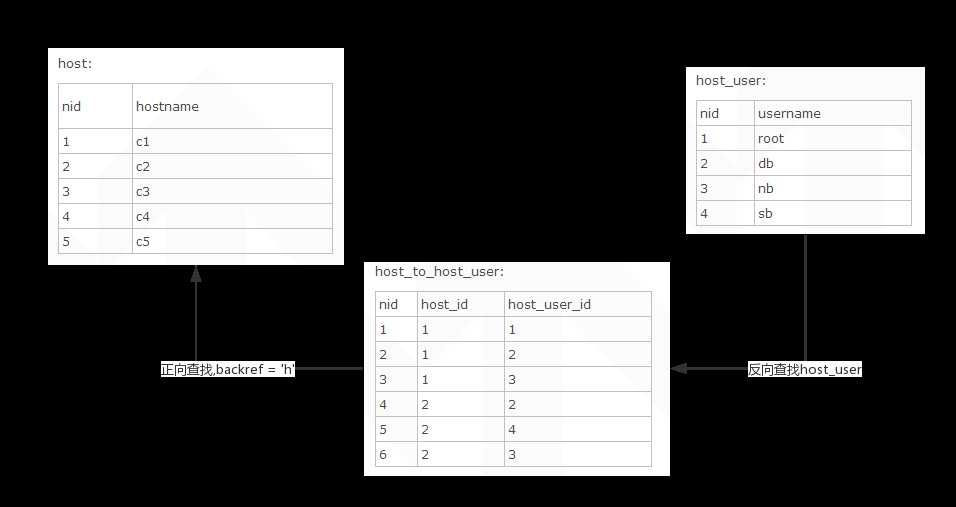Python SQLAlchemy之多对多
Posted
tags:
篇首语:本文由小常识网(cha138.com)小编为大家整理,主要介绍了Python SQLAlchemy之多对多相关的知识,希望对你有一定的参考价值。
1.新建三张表host,host_user,host_to_host_user
host:
|
nid |
hostname |
| 1 | c1 |
| 2 | c2 |
| 3 | c3 |
| 4 | c4 |
| 5 | c5 |
host_user:
| nid | username |
| 1 | root |
| 2 | db |
| 3 | nb |
| 4 | sb |
host_to_host_user:
| nid | host_id | host_user_id |
| 1 | 1 | 1 |
| 2 | 1 | 2 |
| 3 | 1 | 3 |
| 4 | 2 | 2 |
| 5 | 2 | 4 |
| 6 | 2 | 3 |
第一个问题:我们需要查询c1服务器里面的用户都有哪些?
如果使用传统的方法,我们使用下面的语句来实现功能:
#取主机名为c1的服务器ID号 host_obj = session.query(Host).filter(Host.hostname == ‘c1‘).first() #通过获取到的服务器ID号去对应的关系表中找到用户ID,得到一个列表,里面是元祖 host_2_host_user = session.query(HostToHostUser.host_user_id).filter(HostToHostUser.host_id == host_obj.nid).all() # print (host_2_host_user) #[(1,), (2,), (3,)] #处理元祖 ret = zip(*host_2_host_user) # print (list(ret)[0]) users = session.query(HostUser.username).filter(HostUser.nid.in_(list(ret)[0])).all() print (users)
执行结果:
[(‘root‘,), (‘db‘,), (‘nb‘,)]
使用新方式来实现,在建表的步骤里面我们加入了新的relationship:

#coding:utf-8 from sqlalchemy.ext.declarative import declarative_base from sqlalchemy import Column, Integer, String, ForeignKey, UniqueConstraint, Index from sqlalchemy.orm import sessionmaker, relationship from sqlalchemy import create_engine engine = create_engine("mysql+pymysql://root:[email protected]/beadata", max_overflow=5) Base = declarative_base() class Host(Base): __tablename__ = ‘host‘ nid = Column(Integer,primary_key=True,autoincrement=True) hostname = Column(String(32)) class HostUser(Base): __tablename__ = ‘host_user‘ nid = Column(Integer,primary_key=True,autoincrement=True) username = Column(String(32)) class HostToHostUser(Base): __tablename__ = ‘host_to_host_user‘ nid = Column(Integer,primary_key=True,autoincrement=True) host_id = Column(Integer,ForeignKey(‘host.nid‘)) host_user_id = Column(Integer,ForeignKey(‘host_user.nid‘)) host = relationship(‘Host‘,backref = ‘h‘) host_user = relationship(‘HostUser‘,backref = ‘u‘) Session = sessionmaker(bind=engine) session = Session() # session.add_all([ # Host(hostname=‘c1‘), # Host(hostname=‘c2‘), # Host(hostname=‘c3‘), # Host(hostname=‘c4‘), # Host(hostname=‘c5‘), # ]) # # session.add_all([ # HostUser(username=‘root‘), # HostUser(username=‘db‘), # HostUser(username=‘nb‘), # HostUser(username=‘sb‘), # ]) # # session.add_all([ # HostToHostUser(host_id=‘1‘,host_user_id=‘1‘), # HostToHostUser(host_id=‘1‘,host_user_id=‘2‘), # HostToHostUser(host_id=‘1‘,host_user_id=‘3‘), # HostToHostUser(host_id=‘2‘,host_user_id=‘2‘), # HostToHostUser(host_id=‘2‘,host_user_id=‘4‘), # HostToHostUser(host_id=‘2‘,host_user_id=‘3‘), # ]) host_obj = session.query(Host).filter(Host.hostname == ‘c1‘).first() print (host_obj.nid) print (host_obj.hostname) print (host_obj.h)
执行结果:
1 c1 [<__main__.HostToHostUser object at 0x0000000003FA3208>, <__main__.HostToHostUser object at 0x0000000003FA3278>, <__main__.HostToHostUser object at 0x0000000003FA32E8>]
host_obj.h获取到三个对象,然后循环这三个对象,可以得到这三个对象中的host_to_host_user表中的host_user.nid,host_user.host_id,host_user.host_user_id:
for item in host_obj.h: print (item.host_user,item.host_user.username)
执行结果:
1 c1 [<__main__.HostToHostUser object at 0x0000000003FA2208>, <__main__.HostToHostUser object at 0x0000000003FA2278>, <__main__.HostToHostUser object at 0x0000000003FA22E8>] <__main__.HostUser object at 0x0000000003FA28D0> root <__main__.HostUser object at 0x0000000003FA2A90> db <__main__.HostUser object at 0x0000000003FA2C50> nb
以上是关于Python SQLAlchemy之多对多的主要内容,如果未能解决你的问题,请参考以下文章